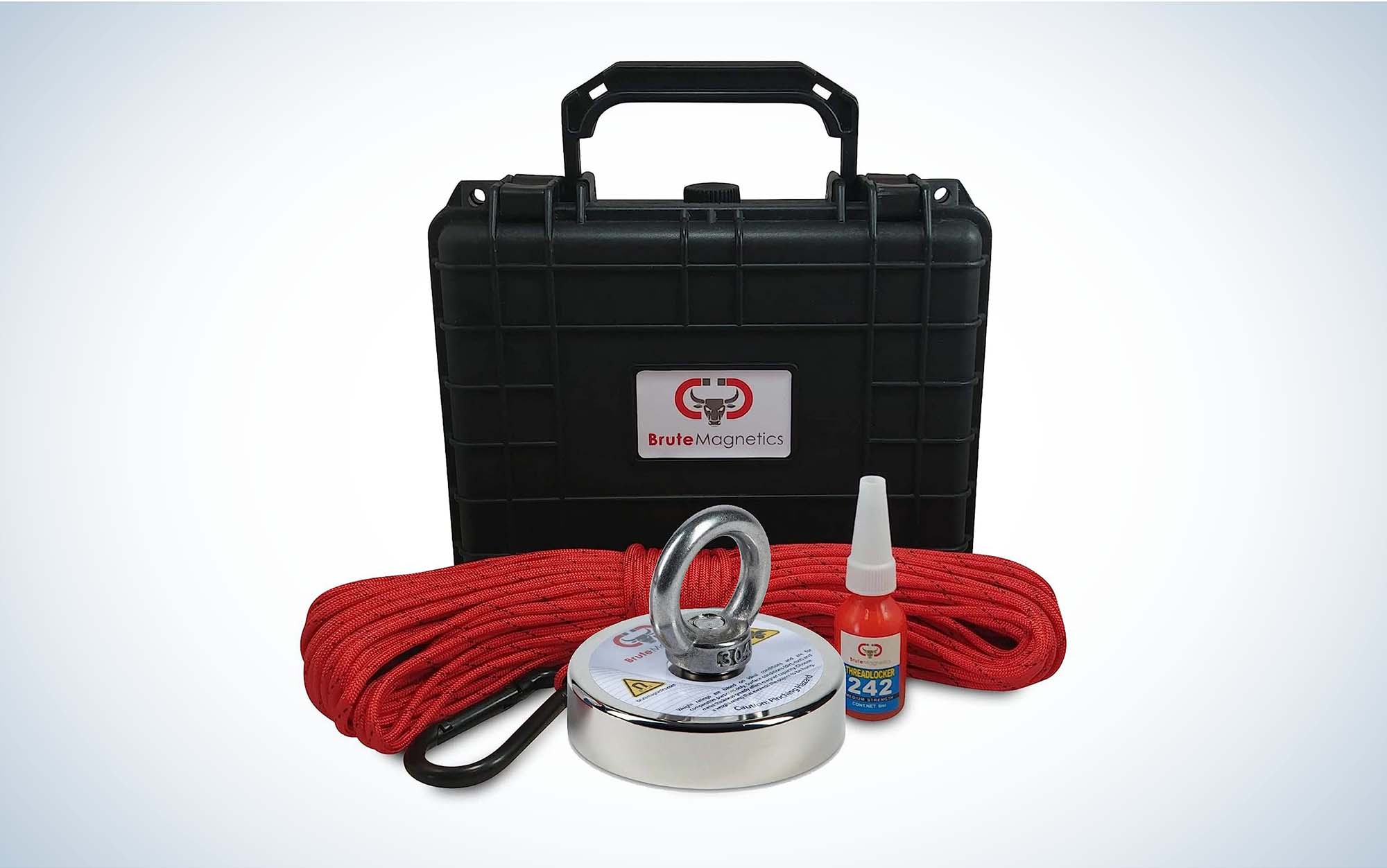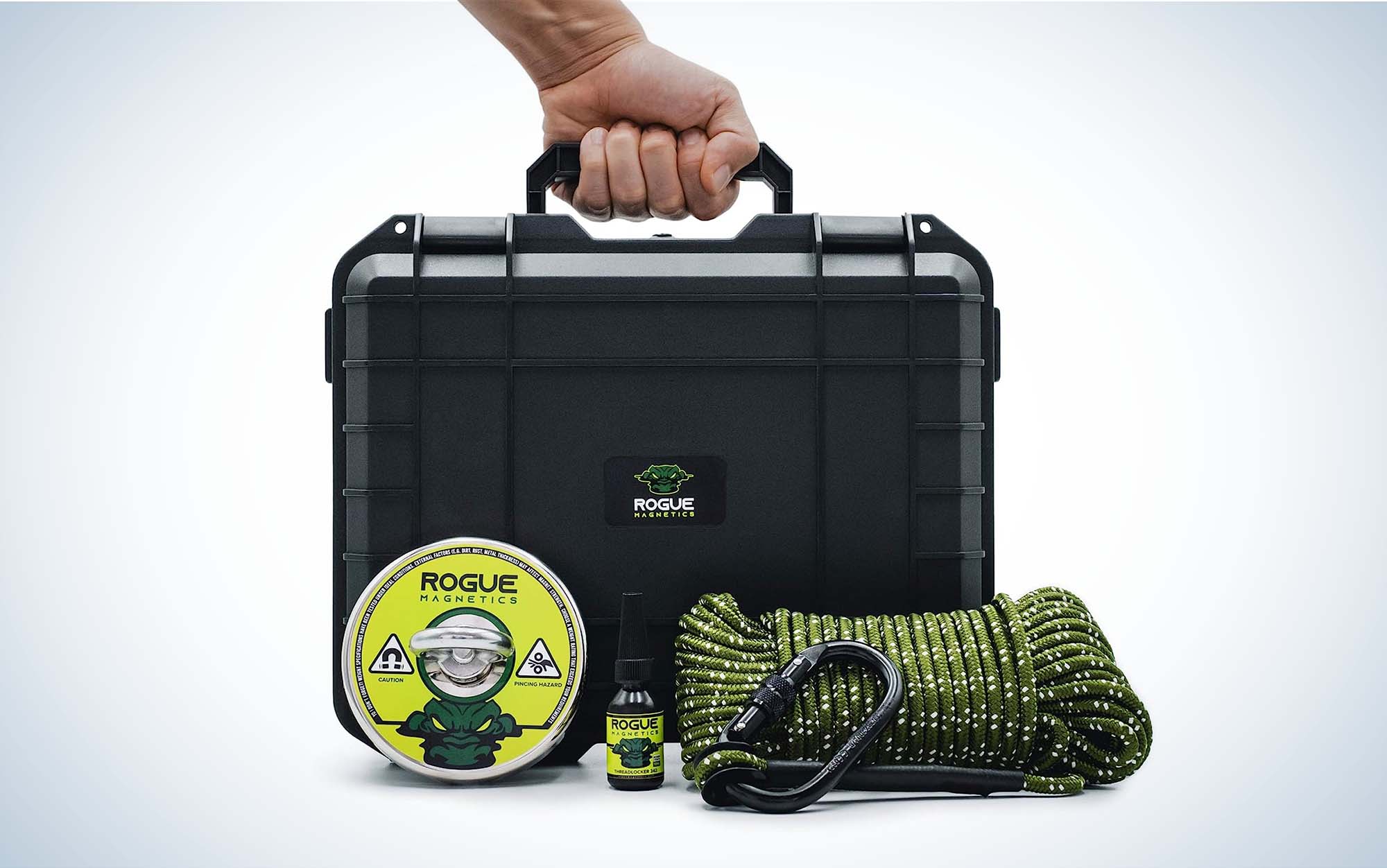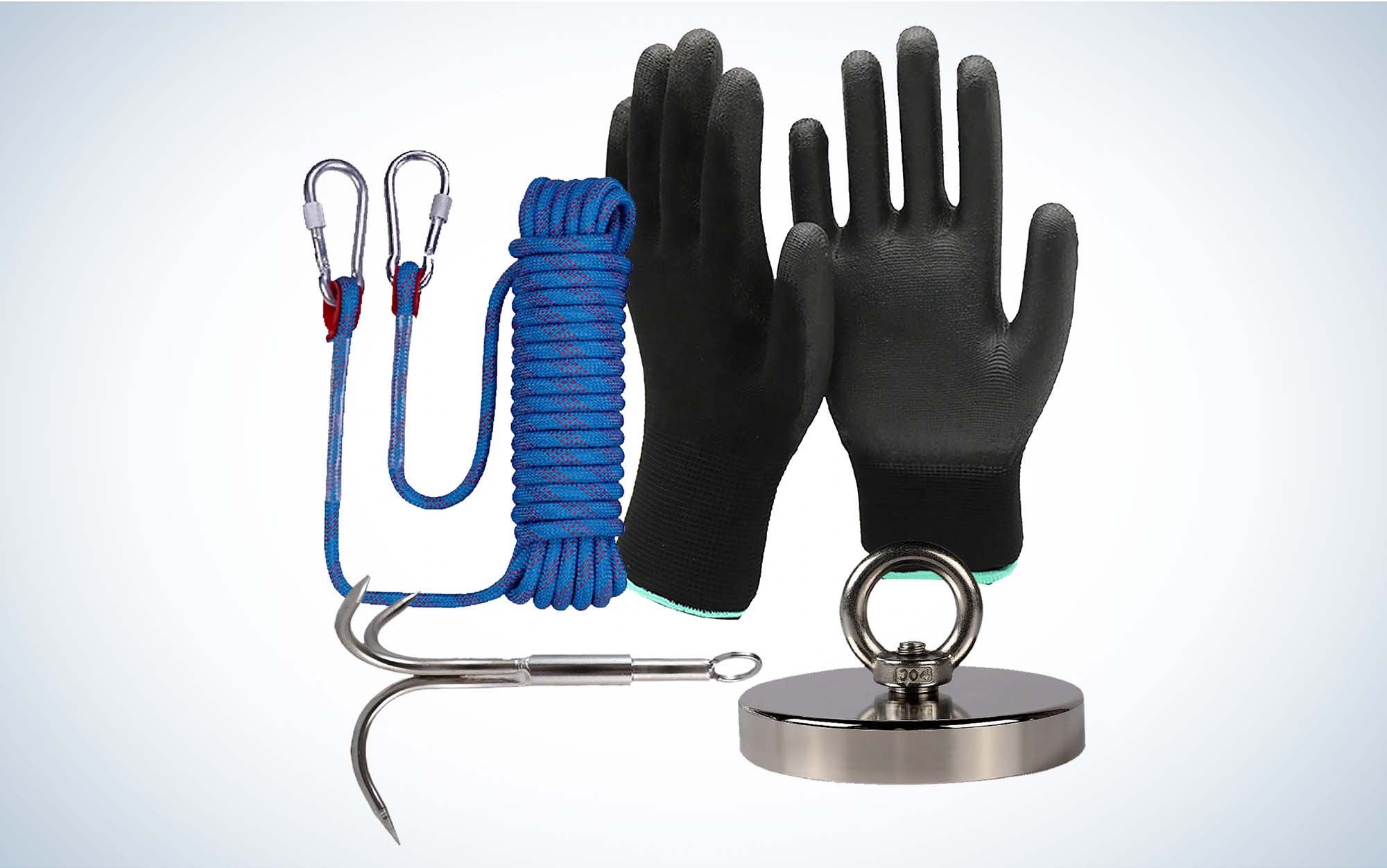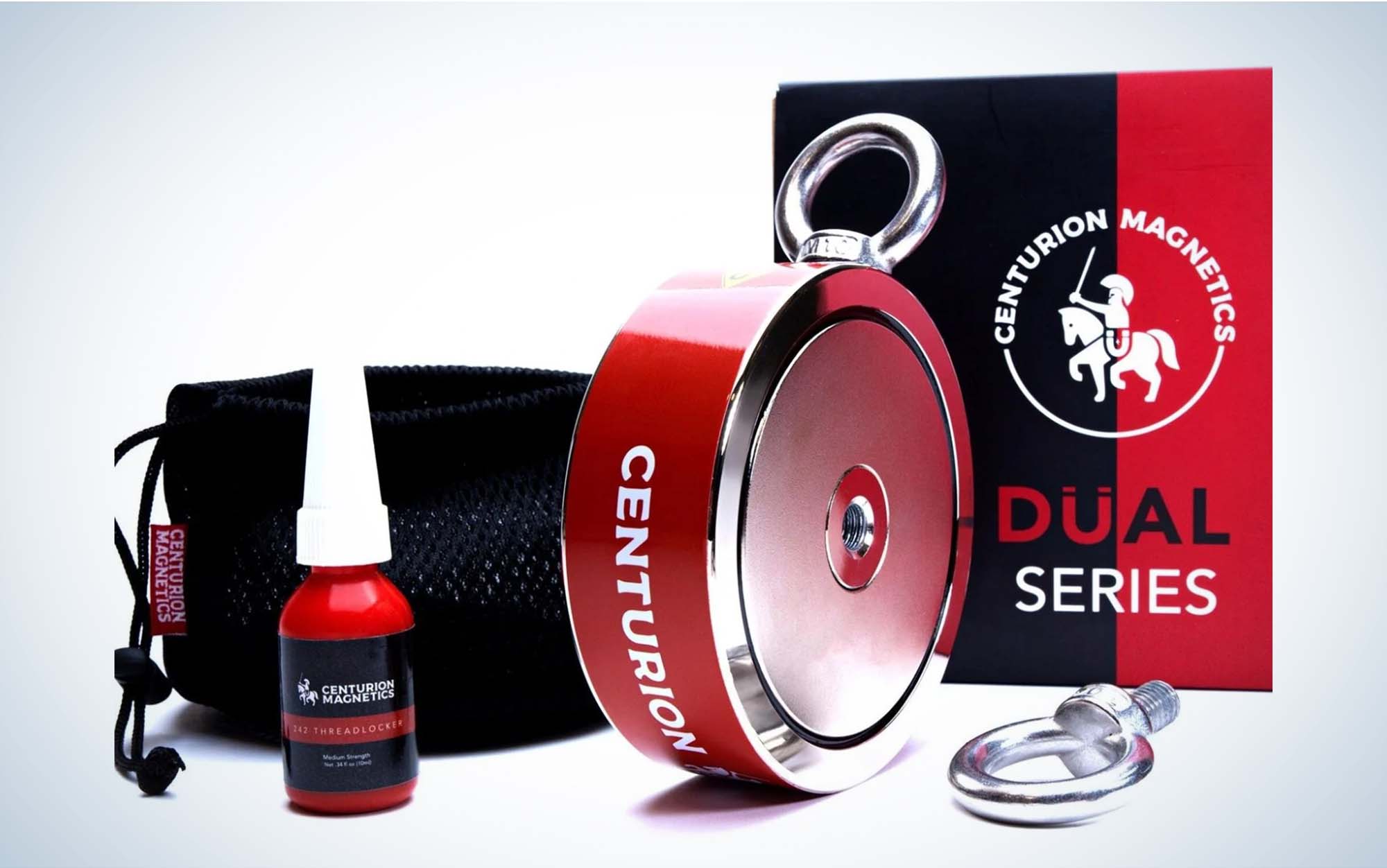We may earn revenue from the products available on this page and participate in affiliate programs. Learn More ›
Published Jun 28, 2023 1:30 PM
There’s way more to catch from America’s waters than fish. Just ask the growing population of magnet fishing experts who haul everything from road signs to kitchen knives to guns out of the rivers and lakes all over the country. But to get into the scene, it’s important to know a thing or two about how to pick the best magnets for magnet fishing.
Magnet fishing is basically metal detecting underwater. Instead of scanning the dirt for buried treasure, people tie high-powered magnets to long, sturdy rope and cast the rig into a body of water. Depending on the strength of the magnet—and the strength of the human hauling it in—magnet fishers might pull hundreds of pounds of junk from the water on a given day. Some also use big three-prong grappling hooks to snag heavier items.
To help you decide on how to get started magnet fishing, we talked to Bryce Nachtwey, an expert magnet fisher who spends most of his days pulling junk and treasures out of waters around the country, putting a lot of wear and tear on his gear in the process. (You might remember him as the guy who pulled dozens of rockets and other munitions out of a pond on a Georgia army base in 2022).
How to Choose a Magnet for Magnet Fishing
When Nachtwey chooses a magnet, he considers what style of magnet would work best for the water he’s fishing, how much power and force he’ll need to get certain items up, and what features and accessories will help him the most.
Types of Magnets for Magnet Fishing
Magnets come in a variety of sizes and designs. The most standard magnets are round, one-sided plates with a threaded hole for an eyebolt on the non-magnetic side.
“It’s just like how you have a different fishing rod for different situations,” Nachtwey says. “You’ve got different magnets for different situations. Flat, single-sided magnets are best for throwing straight off a bridge or jigging up and down from a boat ramp.”
Other fishing magnets are “two-sided,” which means they come with two threaded holes—one on one magnetic face and one on the perimeter. Screw the eyebolt into the perimeter to fish it double-sided, or screw it into the magnetic face to fish it like a single-sided magnet.
“If you’re magnet fishing from a bank, go with a double-sided magnet,” Nachtwey says. “The goal is always to keep the magnetic part flat on the ground under the water. [The double-sided magnet] makes for the best odds for pulling something up.”
For more advanced magnet fishers, a 360-degree magnet attracts from all directions. The average 360-degree magnet has a pull force of 3,500 pounds and can either be dragged from a bank or pulled up from a bridge. It looks like a counterweight and is very expensive.
“The 360-degree magnets are very interesting. You get the best of both worlds. But you also pay for it,” Nachtwey says. “They’re quite a bit more expensive because they cost a lot more to produce.”
Magnet Power
When you start shopping for a fishing magnet, you will see a variety of different pull force ratings on both single- and double-sided magnets. It can be confusing to know exactly what you need. But Nachtwey recommends a 1,500-pound magnet for any adult magnet fisher.
“A 1,500-pound magnet covers more ground and just allows you to get more magnet surface area on what you’re trying to find,” he says. “[This will] increase your odds of getting the find up.”
Nachtwey recommends a 500-pound magnet for kids. Magnets of that power are still strong enough to pick up coins and small objects but weigh much less than larger, higher-powered pieces, making them easier to throw and pull in for a few hours.
“The stronger magnets will be heavier. The 1,500s are like five and a half pounds,” he says. “It comes down to what you think you can throw all day long. The 1,500 just has more surface area than a 500-pound magnet.”
Double-sided magnets are rated by the combined force of the two magnetic faces. If you see a 2,400-pound double-sided magnet, that means it has two 1,200-pound faces. This doesn’t necessarily make it any stronger than a single-sided 1,200-pound magnet. But it does double the magnetic surface area, increasing your odds, Nachtwey says.
Magnet Fishing Kits
A lot of magnets come in kits that include rope, gloves, threadlocker, and other useful accessories. Strong, sturdy rope is crucial for both standing up to bigger retrieves and being more comfortable in your hands, Nachtwey says. Polyurethane gloves keep you protected against any rusty metal and sharp edges you’re likely to encounter while pulling junk off your magnet. And threadlocker gives you some added piece of mind that the eyebolt won’t magically strip its threaded hole, abandoning the magnet on the bed of a river.
Some kits even come with a three-pronged hook, which Nachtwey calls “the claw.”
“The claw is the second most essential thing to any magnet fisherman,” he says. “Sometimes you hook something that the magnet just doesn’t want to get, whether it’s under a log or stuck in the mud. You can hook it with the claw and it has a much better chance of coming up. Some of my best finds have been with the claw.”
Other kits offer a lot of extra accessories that aren’t as crucial, in Nachtwey’s opinion—like plastic scrapers for detaching small pieces of metal from the magnet and big, bulky carrying cases.
“All you need is a 5-gallon bucket in the corner of your garage,” he says. “I keep the entire kit—the magnet, the rope, the gloves, the claw—all in a pail. That’s what’s so cool about magnet fishing; it’s a fairly cheap hobby to get into.”
The Best Magnets for Magnet Fishing: Reviews and Recommendations
Best Single-Sided Magnet: Brute Magnetics 1500-Lb Single-Sided Magnet
Key Features
- 1,500-pound pull force
- Eyebolt with screw and washer included
- 6-milliliter bottle of threadlocker
Pros
- Affordable
- Versatile, mid- to high-level pull force
- Sturdy materials
- Threadlocker included
Cons
This single-sided piece is the ideal magnet to get you in the game and it’s one of the most common magnets out there. The 1,500-pound pull force offers plenty of grip that’s capable of hauling in bikes, road signs, safeboxes, and pretty much anything else the average person would be able to yank in and dislodge without help from another person or a winch. This Brute Magnetics offer is affordable for beginner magnet fishers who don’t want to sink a bunch of money into the hobby quite yet. This is also a good option for more experienced folks who already have rope, gloves, and other accessories and just need a replacement magnet. And hey—you can never have too much threadlocker.
Read Next: Best Fishing Shirts
Best Starter Kit for Kids: Brute Magnetics 425 Junior Magnet Fishing Kit
Key Features
- 425-pound, single-sided magnet
- 100 feet of nylon rope rated to 649 pounds
- Carabiner on one end of rope
- Threadlocker
- Padded, laser-cut carrying case
Pros
- Small magnet very manageable for true beginners
- Carrying case keeps equipment organized for potentially-forgetful junior magnet fishers
- Affordable
Cons
- No gloves included
- Long rope could require trimming for kids
This junior kit from Brute Magnetics features a small-but-mighty 425-pound single-sided magnet, 100 feet of paracord with a carabiner on one end, a small bottle of threadlocker, and a lunchbox-sized carrying case. This kit is the perfect size and strength for introducing kids to the world of magnet fishing—just make sure to pick up some sturdy gloves so the thin paracord doesn’t cause rope burn.
Best Budget Starter Kit: Rogue Magnetics Beast Box 1200-Lb Pro Kit
Key Features
- 1,200-pound single-sided magnet
- 65 feet of rope rated to 1,300 pounds with carabiner
- Threadlocker
- Hard-sided carrying case
Pros
- Reasonable price for higher-powered magnet
- Inclusive kit with everything you need
- Hard-sided carrying case keeps gear organized
Cons
- No gloves included
- Sale price could change
A good sale is always worth recognizing, and right now, Rogue Magnetics’ 1200-pound starter kit is one of the best deals on the market at less than $78.The kit includes a single-sided 1,200-pound magnet, high-strength rope with an ultra-tough carabiner, threadlocker, and even one of those fancy laser-cut carrying cases. Grab some gloves and you’re good to go.
Best Starter Kit: Battle Magnets Big Battle Box Starter Kit
Key Features
- 1,500-lb single-sided magnet
- Polyurethane-coated gloves
- 60 feet of climbing-grade rope with carabiners on each end
- Claw extension
Pros
- Rope with carabiners on both ends offers options for retrieval and security
- Rope reinforced around attachment point to carabiners for durability
- Claw adds versatility to set-up
- Less expensive than other kits
Cons
- No carrying case or threadlocker
Magnet fishing starter kits can get expensive fast. This option from Battle Magnets gives you everything you need with nothing you don’t. (Why pay an extra $50 for a plastic scraper when you have a plastic putty knife lying around?)
Instead, you’re paying for a pair of polyurethane-coated gloves with countless applications, a grappling hook that can help with more complex retrievals, and 60 feet of super high-quality rope with carabiners on each reinforced end. For $120, that’s a pretty good deal.
Best Double-Sided Magnet: Centurion Magnetics 2400 Dual Series
Key Features
- 2,400 pounds of combined pull force, 1,200 pounds on each side of magnet
- Two threaded holes with eyebolts for each one
- Threadlocker
- Mesh carrying pouch
Pros
- Versatility of mounting eyebolt either on magnet perimeter (for two-sided use) or face (similar to one-sided magnets)
- Screw integrated into eyebolt, not separate from it
- Access to exclusive instructional videos with purchase
- Reasonably priced
Cons
- Must buy rope separately
- Heavier than single-sided magnet
The dual-sided magnet is a step up from the traditional single-sided magnets that most beginners use. Because of its versatility, this is one of the best magnets for magnet fishing in a variety of scenarios. When the eyebolt is mounted on the perimeter of the magnet, dragging the apparatus along the floor of a body of water is much easier, and two magnet faces offer double the surface area for grabbing onto cool finds. Mounting the eyebolt on the magnet face and fishing it like a single-sided magnet is more effective for retrieving metal straight up from below, like you would from a bridge.
FAQs
How is the pull force of a fishing magnet measured?
Just because a magnet is rated to 2,400 pounds doesn’t necessarily mean it could pick up a pontoon boat by locking onto a single screw. If that were the case, no amount of human strength would be capable of extracting metal from that magnet. Instead, the pull force of a magnet is calculated by how much force is required to detach a magnet in “ideal conditions,” as Nachtwey says. That means pulling the magnet straight up from a solid, ½-inch-thick steel plate on which the entire magnetic face is fixed.
How do you separate magnets from items?
Magnets are strongest in the direction their force flows. Pulling a magnet off a piece of metal by applying force in the exact opposite direction is the most difficult way to dislodge that magnet. Instead, slide the magnet parallel to the piece of metal (or slide the piece of metal parallel to the magnet face) to dislodge it. This strategy uses “shear force,” or an oppositional force that moves parallel to an object rather than perpendicular to it. A magnet is five times weaker when shear force is applied to the piece of metal than when direct force is applied.
With that said, dislodging a powerful magnet from, say, a metal pier beam still requires a lot of force. For that reason, if you don’t have experience dislodging extremely high-powered magnets, it’s best to start out with less power.
How strong of a magnet do I need for magnet fishing?
According to Nachtwey, if you’re an adult with a normal amount of strength, you should go with a 1,500-pound magnet. This will allow you to collect everything from bikes and car parts to shopping carts and other bigger, bulkier items. You also won’t miss out on the cool small stuff too, like coins, jewelry, and maybe even a gun or two. For your kids, look for a 500-pound magnet.
What are the different types of magnets for magnet fishing?
A single-sided magnet is the most standard piece of equipment. Double-sided magnets are a bit more complex, as they offer a choice for where to mount the eyebolt and can be fished a few different ways. Some other, more advanced types of fishing magnets include heavy 360-degree magnets and “clamp” magnets that offer more pull from further distances. Both can cost a few hundred dollars for the magnet alone.
Which magnets are the best quality?
All these magnets are considered to be made of the highest-quality rare earth minerals on the market. They’re made of an alloy of neodymium, iron, and boron. This alloy, most commonly referred to just as neodymium, produces the highest-strength permanent magnet, or magnet with a force that is still present in the absence of an electric current (unlike an electromagnet, which turns on and off with an electric current).
These magnets are also made with nickel or nickel-copper coatings that protect them from rusting and other wear-and-tear. Since iron is part of the neodymium alloy, corrosion is possible if the coating gets chipped or otherwise compromised.
Final Thoughts
After a surge in popularity during the COVID-19 pandemic, the magnet fishing obsession isn’t going anywhere anytime soon—especially as more people share their rare finds on social media and in the news. If you’ve been on the hunt for a magnet fishing starter kit, there are lots of options out there. Find one that meets your needs and complements the equipment you already have. If you have six pairs of gloves and more high-strength rope than you know what to do with, find a standalone magnet. If you don’t have any of the required gear, there are plenty of kits out there that can meet your needs.
Lastly, the best magnets for magnet fishing come from companies that are small and family-owned. They tend to be run by seasoned magnet fishers who sell gear they trust and use frequently. Support those businesses if possible. Products from small, specialty businesses will likely be more successful and durable.




